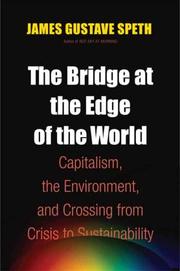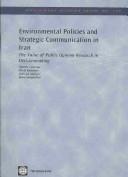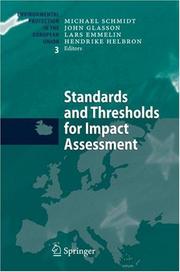| Listing 1 - 10 of 43 | << page >> |
Sort by
|
Book
ISBN: 0295800542 9780295800547 9780295988559 029598855X 9780295988566 0295988568 Year: 2008 Publisher: Seattle University of Washington Press
Abstract | Keywords | Export | Availability | Bookmark
 Loading...
Loading...Choose an application
- Reference Manager
- EndNote
- RefWorks (Direct export to RefWorks)
As societies around the world are challenged to respond to ever growing environmental crises, it has become increasingly important for activists, policy makers, and environmental practitioners to understand the dynamic relationship between environmental movements and the state. In communist Eastern Europe, environmental activism fueled the rise of democratic movements and the overthrow of totalitarianism. Yet, as this study of environmentalism in Slovakia shows, concern for the environment declined during the post-communist period, an ironic victim of its own earlier success.Through ethnographic interviews and archival materials, Edward Snajdr explains why Slovakia's ecology movement, so strong under socialism, fell apart so rapidly despite the persistence of serious environmental problems in the region. Synthesizing theory in anthropology and political ecology, he suggests that the fate of environmentalism in Slovakia marks the beginning of a global post-ecological age, where nature is culturally maginalized in new ways.In addition to its significance for policy makers, this book will be a valuable resource for anthropologists, sociologists, political ecologists, and scholars of East European and post-Soviet studies.
Environmental policy --- Environmentalism --- Environment and state --- Environmental control --- Environmental management --- Environmental protection --- Environmental quality --- State and environment --- Environmental auditing --- Environmental movement --- Social movements --- Anti-environmentalism --- Sustainable living --- Government policy --- Environmnental policy --- Environnementalisme --- Environnement --- Politique gouvernementale --- Greenwashing

ISBN: 9780300136111 0300136110 9786612089503 1282089501 128208951X 9786612089510 0300151152 0300145306 9780300145304 9780300144598 0300144598 9781282089501 9781282089518 9780300145304 9780300151152 6612089504 6612089512 Year: 2008 Publisher: New Haven
Abstract | Keywords | Export | Availability | Bookmark
 Loading...
Loading...Choose an application
- Reference Manager
- EndNote
- RefWorks (Direct export to RefWorks)
How serious are the threats to our environment? Here is one measure of the problem: if we continue to do exactly what we are doing, with no growth in the human population or the world economy, the world in the latter part of this century will be unfit to live in. Of course human activities are not holding at current levels-they are accelerating, dramatically-and so, too, is the pace of climate disruption, biotic impoverishment, and toxification. In this book Gus Speth, author of Red Sky at Morning and a widely respected environmentalist, begins with the observation that the environmental community has grown in strength and sophistication, but the environment has continued to decline, to the point that we are now at the edge of catastrophe. Speth contends that this situation is a severe indictment of the economic and political system we call modern capitalism. Our vital task is now to change the operating instructions for today's destructive world economy before it is too late. The book is about how to do that.
Environmental economics. --- Capitalism --- Environmental policy. --- Economie de l'environnement --- Environnement --- Environmental aspects. --- Politique gouvernementale --- Capitalism -- Environmental aspects. --- Electronic books. -- local. --- Environmental economics --- Environmental policy --- Business & Economics --- Economic History --- Environmental aspects --- Environment and state --- Environmental control --- Environmental management --- Environmental protection --- Environmental quality --- State and environment --- Market economy --- Economics --- Government policy --- Economic aspects --- Environmental auditing --- Profit --- Capital --- NATURE / Environmental Conservation & Protection
Periodical
ISSN: 19139071 19139063 Year: 2008 Publisher: Toronto : Canadian Center of Science and Education.
Abstract | Keywords | Export | Availability | Bookmark
 Loading...
Loading...Choose an application
- Reference Manager
- EndNote
- RefWorks (Direct export to RefWorks)
Sustainable development --- Environmental policy --- Environmental policy. --- Sustainable development. --- Development, Sustainable --- Ecologically sustainable development --- Economic development, Sustainable --- Economic sustainability --- ESD (Ecologically sustainable development) --- Smart growth --- Sustainable economic development --- Environment and state --- Environmental control --- Environmental management --- Environmental protection --- Environmental quality --- State and environment --- Political aspects --- Government policy --- Economic development --- Environmental auditing --- Environmental aspects --- Développement durable

ISBN: 1281191353 9786611191351 0821374222 0821374214 Year: 2008 Publisher: Washington, DC : World Bank,
Abstract | Keywords | Export | Availability | Bookmark
 Loading...
Loading...Choose an application
- Reference Manager
- EndNote
- RefWorks (Direct export to RefWorks)
Air pollution in Tehran has become a major problem in recent years, due to the geographical position of the town, industries, and traffic. Most private and public vehicles are old and have no emission control systems. The Municipality of Tehran and the Department of Environment have started several actions to reduce pollution, with communication activities being part of their strategy. For better planning, and to make possible the monitoring and evaluation of the communication activities, a baseline study was completed in 2004 using direct interviews of 1,200 Tehran residents. The interviews c
Environmental policy --- Public opinion polls --- Decision making --- Deciding --- Decision (Psychology) --- Decision analysis --- Decision processes --- Making decisions --- Management --- Management decisions --- Opinion polls --- Polls, Public opinion --- Public opinion --- Public opinion research --- Straw votes --- Environment and state --- Environmental control --- Environmental management --- Environmental protection --- Environmental quality --- State and environment --- Research --- Government policy --- Choice (Psychology) --- Problem solving --- Social surveys --- Market surveys --- Environmental auditing
Book
ISBN: 9812308334 Year: 2008 Publisher: Singapore : Institute of Southeast Asian Studies,
Abstract | Keywords | Export | Availability | Bookmark
 Loading...
Loading...Choose an application
- Reference Manager
- EndNote
- RefWorks (Direct export to RefWorks)
In the past two decades, research on environmental issues in East and Southeast Asian countries has mainly focused on existing institutional mechanisms of environmental management, the establishment of new environmental management structures, the introduction of incentives to improve natural capital and foster environmental protection, and the culture of environmental or "green" groups. Virtually no rigorous research has been directed into the nature and significance of the existing relationship between government and civil society in individual country studies, with specific reference to the environmental policy sector, or into how this relationship may be evolving. This book explores this connection in Singapore, and what causes it to evolve, through three case narratives. Its rationale is to address this gap in the literature from a "governance theory" perspective that focuses on state adaptation to the external environment and new forms of coordination and collaboration between government and civil society to tackle new societal problems. The application of the "governance theory" approach to specific case studies is itself a topic that deserves much greater study than what it has so far received.
Civil society --- Environmental protection --- Environmental policy --- Citizen participation. --- Singapore --- Politics and government. --- Environmental quality management --- Protection of environment --- Environmental sciences --- Applied ecology --- Environmental engineering --- Environmental quality --- Social contract --- Environment and state --- Environmental control --- Environmental management --- State and environment --- Environmental auditing --- Government policy
Book
ISBN: 9780521182652 9780521888127 0521888123 9780511491030 9780511415319 0511415311 0511491034 0521182654 110718732X 1281751294 9786611751296 0511414633 0511412096 0511413955 0511413033 9781281751294 6611751297 9780511414633 9780511412097 9780511413957 Year: 2008 Publisher: Cambridge New York Cambridge University Press
Abstract | Keywords | Export | Availability | Bookmark
 Loading...
Loading...Choose an application
- Reference Manager
- EndNote
- RefWorks (Direct export to RefWorks)
As the information revolution continues to accelerate, the environment remains high on public and political agendas around the world. These two topics are rarely connected, but information - its collection, processing, accessibility and verification - is crucial in dealing with environmental challenges such as climate change, unsustainable consumption, biodiversity conservation and waste management. The information society (encompassing entities such as the internet, satellites, interactive television and surveillance cameras) changes the conditions and resources which are involved in environmental governance: old modes and concepts are increasingly being replaced by new, informational ones. Arthur P. J. Mol explores how the information revolution is changing the way we deal with environmental issues; to what extent and where these transformations have (and have not) taken place; and what the consequences are for democracy and power relations. This book will appeal to scholars and students of environmental studies and politics, political sociology, geography and communications studies.
Environmental policy --- Environmental management --- Information technology --- Environmental management. --- Environmental policy. --- Information technology. --- Environnement --- Technologie de l'information --- Politique gouvernementale --- Gestion --- #SBIB:35H24 --- #SBIB:35H434 --- IT (Information technology) --- Technology --- Telematics --- Information superhighway --- Knowledge management --- Environment and state --- Environmental control --- Environmental protection --- Environmental quality --- State and environment --- Environmental auditing --- Environmental stewardship --- Stewardship, Environmental --- Environmental sciences --- Management --- Informatiemanagement bij de overheid --- Beleidssectoren: milieubeleid en ruimtelijke ordening --- Government policy --- Social Sciences --- Political Science
Book
ISBN: 0262285444 1435677293 9780262285445 9781435677296 9780262220842 0262220849 9780262720526 0262720523 Year: 2008 Publisher: Cambridge, MA : MIT Press,
Abstract | Keywords | Export | Availability | Bookmark
 Loading...
Loading...Choose an application
- Reference Manager
- EndNote
- RefWorks (Direct export to RefWorks)
Political theorists consider the challenge of global climate change from a range of perspectives, including conceptual analysis, critical theory, critical legal studies, and neo-Marxism.
Climatic changes --- Environmental policy. --- Environmental justice. --- Environmental ethics. --- Political aspects. --- Social aspects. --- Environmental quality --- Human ecology --- Eco-justice --- Environmental justice movement --- Global environmental justice --- Environment and state --- Environmental control --- Environmental management --- Environmental protection --- State and environment --- Moral and ethical aspects --- Government policy --- Ethics --- Environmental policy --- Environmentalism --- Social justice --- Environmental auditing --- ENVIRONMENT/General --- ENVIRONMENT/Environmental Politics & Policy --- Environmental ethics --- Environmental justice --- #SBIB:327.1H10 --- #SBIB:327.7H42 --- Political aspects --- Social aspects --- Internationale betrekkingen: theorieën --- Specifieke internationale organisaties en samenwerking: milieu
Book
ISBN: 1281776440 9786611776442 0813545137 9780813545134 0813543134 0813543142 9780813543130 9780813543147 9781281776440 6611776443 0813543134 9780813543130 Year: 2008 Publisher: New Brunswick, N.J. Rutgers University Press
Abstract | Keywords | Export | Availability | Bookmark
 Loading...
Loading...Choose an application
- Reference Manager
- EndNote
- RefWorks (Direct export to RefWorks)
In this collection, Timothy Doyle and Melissa Risely bring together an international group of environmentalists, political scientists, and international relations scholars to address key issues vital to determining the human and environmental security of the Indian Ocean Region. Addressing topics that include agrifood production systems, the geopolitics of water resources along the Mekong River basin, oil production, transportation, waste disposal, and climate change, the contributors highlight the importance of regional collaboration and offer policy and management strategies for cooperative, multinational problem solving.
Environmental justice - Indian Ocean Region. --- Environmental policy - Indian Ocean Region. --- Environmental policy. --- Environmental protection - Indian Ocean Region. --- Environmental policy --- Environmental protection --- Environmental justice --- Earth & Environmental Sciences --- Environmental Sciences --- Eco-justice --- Environmental justice movement --- Global environmental justice --- Environmentalism --- Social justice --- Environmental quality management --- Protection of environment --- Environmental sciences --- Applied ecology --- Environmental engineering --- Environmental quality --- Environment and state --- Environmental control --- Environmental management --- State and environment --- Environmental auditing --- Government policy

ISBN: 3540311416 3540311408 364206826X 9783540311409 Year: 2008 Volume: 3 Publisher: Berlin: Springer,
Abstract | Keywords | Export | Availability | Bookmark
 Loading...
Loading...Choose an application
- Reference Manager
- EndNote
- RefWorks (Direct export to RefWorks)
Standards and Thresholds play an important role in many stages of the Environmental Impact Assessment (EIA) process. They can be legally-binding or guidance values and are linked to environmental data. This publication provides a comprehensive collection of standards and thresholds, their derivation and application in case studies of EIA projects. The first part introduces the nature of standards and thresholds and key drivers for their determination. The book then describes, in Part II, technical standards from the perspective of EIA projects. Part III addresses the issue from the other side, environment and human health, and discusses the assessment of impacts on the sensitivity or value of environmental and health components. Part IV sets out some emerging issues for standard and threshold with reference to new sectors and with recent instruments. The book concludes in Part V with the role of monitoring, and final implementation.
Environmental impact analysis --- Standards. --- Environment. --- International environmental law. --- Environmental law. --- Environmental policy. --- Environmental management. --- Environmental Law/Policy/Ecojustice. --- International Environmental Law. --- Environmental Management. --- Environmental stewardship --- Stewardship, Environmental --- Environmental sciences --- Management --- Environment and state --- Environmental control --- Environmental management --- Environmental protection --- Environmental quality --- State and environment --- Environmental auditing --- Environment law --- Environmental policy --- Law --- Sustainable development --- International environmental law --- International law --- Common heritage of mankind (International law) --- Government policy --- Law and legislation --- Analysis of environmental impact --- Environmental assessment --- Environmental impact assessment --- Environmental impact evaluation --- Impact analysis, Environmental --- Environmental monitoring --- Environmental impact analysis - Standards
Book
ISBN: 9781422126967 142212696X Year: 2008 Publisher: Boston, MA: Harvard Business School,
Abstract | Keywords | Export | Availability | Bookmark
 Loading...
Loading...Choose an application
- Reference Manager
- EndNote
- RefWorks (Direct export to RefWorks)
Industrial economics --- Foreign trade policy --- Social policy --- Business policy --- Competition, International --- Comparative advantage (International trade) --- Industrial policy --- Environmental policy --- 658.112 --- Site, location, place of business --- Competition, International. --- Environmental policy. --- Industrial policy. --- Social policy. --- Comparative advantage (International trade). --- 658.112 Site, location, place of business --- National planning --- State planning --- Economic policy --- Family policy --- Social history --- Business --- Industries --- Industry and state --- Environment and state --- Environmental control --- Environmental management --- Environmental protection --- Environmental quality --- State and environment --- Environmental auditing --- International competition --- World economics --- International relations --- International trade --- War --- Comparative advantage (Commerce) --- Comparative costs (International trade) --- Heckscher-Ohlin principle --- International division of labor --- Government policy --- Economic aspects
| Listing 1 - 10 of 43 | << page >> |
Sort by
|

 Search
Search Feedback
Feedback About UniCat
About UniCat  Help
Help News
News